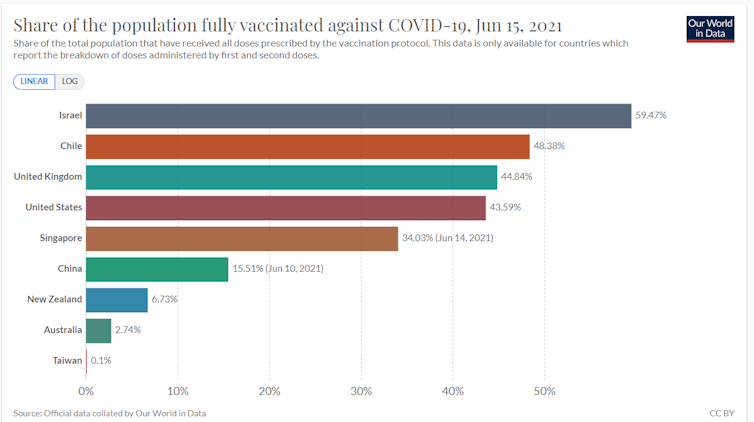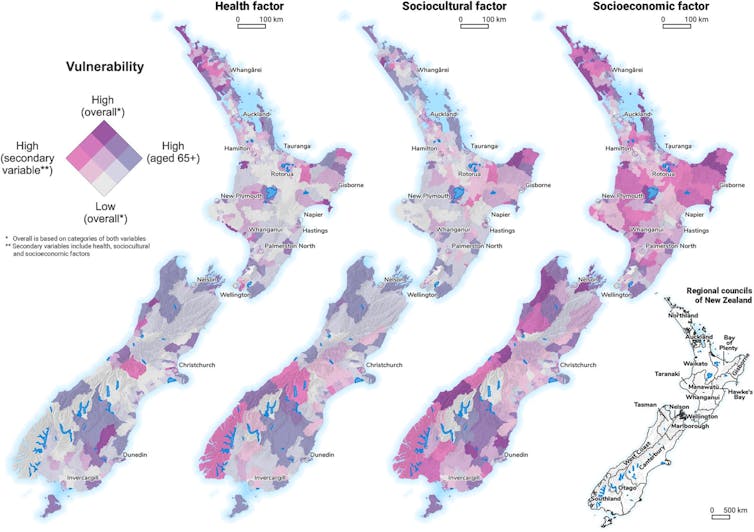Why New Zealand is more vulnerable to a new COVID-19 outbreak than ever before
- Written by Matthew Hobbs, Senior Lecturer in Public Health, University of Canterbury
Health authorities have raised the COVID-19 alert to level 2 for Wellington, from 6pm today until midnight on Sunday, after an Australian traveller who visited the New Zealand capital at the weekend tested positive on their return home.
The news comes only hours after New Zealand paused quarantine-free travel to New South Wales, following ten new community cases in Sydney linked to the Bondi cluster.
Genome sequencing will determine if the Australian visitor carries the more infectious delta variant of COVID-19, but the developments highlight how quickly things can change.
The emergence of more transmittable variants and the complacency of New Zealanders after a 100-day period without community transmission now provide ideal circumstances for a large outbreak.
New Zealand’s pandemic response and elimination strategy have drawn worldwide attention. At this point, the country remains one of few places in the world without community transmission since the end of February 2021.
Countries like Taiwan and Fiji, once also success stories, have seen significant and rapid surges in cases and hospitalisations. What is happening in Taiwan, Fiji and other countries such as Vietnam should be a wake-up call for New Zealand.
Culture of complacency
Overseas news should serve as a constant reminder of New Zealand’s privileged position.
Calls on the government to make the NZ COVID Tracer app mandatory, at the very least in higher-risk places where large numbers of people meet indoors, will likely grow stronger now.
Low and decreasing usage rates of the NZ COVID Tracer app make it more difficult to trace contacts, which leaves us at greater risk of an outbreak, particularly if a more transmissible variant enters the country.
Variants and vaccination
The emergence of new highly infectious variants has already hit close to home with the recent outbreaks in Australia.
New variants are more transmissible and may also decrease the effectiveness of some public health measures. For instance, compared to the original alpha variant, the delta variant is 60% more contagious, making it harder to keep up with in terms of contact tracing. According to UK research, it is also twice as likely to lead to hospitalisation.
Read more: COVID: did a delayed second dose give the delta variant an evolutionary helping hand?
New Zealand is relying on the Pfizer vaccine, but the rollout has been slower than in other countries around the world. The good news is that preliminary research has shown the Pfizer vaccine to be 96% effective against the delta variant.
The problem for New Zealand is that less than 10% of the population is now fully vaccinated and there is variation by region. If an outbreak were to occur with a more transmissible COVID-19 variant, it could spread easily, unless stringent public health measures are in place.
 Our World in Data, CC BY-ND
Vulnerability at the border
On the more positive side, the elimination of COVID-19 has allowed researchers valuable time to identify where vulnerable populations are (see map below) and model potential outbreaks. This helps inform responses to future outbreaks and prioritise vaccination.
Such research should help mitigate potential inequity, which has been evident in many aspects of the COVID-19 response around the globe.
Our World in Data, CC BY-ND
Vulnerability at the border
On the more positive side, the elimination of COVID-19 has allowed researchers valuable time to identify where vulnerable populations are (see map below) and model potential outbreaks. This helps inform responses to future outbreaks and prioritise vaccination.
Such research should help mitigate potential inequity, which has been evident in many aspects of the COVID-19 response around the globe.
 Nationwide area-level vulnerability for adults aged 65+ years in New Zealand by health, sociocultural and socioeconomic factors.
Understanding vulnerability to COVID-19 in New Zealand: a nationwide cross-sectional study, CC BY-ND
New Zealand experienced eight known failures of its COVID-19 border control system between August and November last year, suggesting a systematic underestimation of risk. Since then, mitigation strategies have been put in place and border staff have been vaccinated, but that doesn’t mean the risk is zero.
One possible omission in making travel bubbles safe is the absence of pre-departure testing requirements for those travelling to and from Australia. Pre-departure testing is no guarantee, but New Zealand should consider extending it to all travellers, not just those from higher-risk countries.
Read more:
New Zealand approves Pfizer vaccine for young people from 12 to 15, but they'll have to wait their turn
While New Zealanders wait to be vaccinated, we need to do our bit and keep scanning in, turning on Bluetooth on the NZ COVID Tracer app, maintaining good hand hygiene and getting a test if required.
Acting quickly makes it easier to stop the chain of transmission and stamp out cases of COVID-19.
Nationwide area-level vulnerability for adults aged 65+ years in New Zealand by health, sociocultural and socioeconomic factors.
Understanding vulnerability to COVID-19 in New Zealand: a nationwide cross-sectional study, CC BY-ND
New Zealand experienced eight known failures of its COVID-19 border control system between August and November last year, suggesting a systematic underestimation of risk. Since then, mitigation strategies have been put in place and border staff have been vaccinated, but that doesn’t mean the risk is zero.
One possible omission in making travel bubbles safe is the absence of pre-departure testing requirements for those travelling to and from Australia. Pre-departure testing is no guarantee, but New Zealand should consider extending it to all travellers, not just those from higher-risk countries.
Read more:
New Zealand approves Pfizer vaccine for young people from 12 to 15, but they'll have to wait their turn
While New Zealanders wait to be vaccinated, we need to do our bit and keep scanning in, turning on Bluetooth on the NZ COVID Tracer app, maintaining good hand hygiene and getting a test if required.
Acting quickly makes it easier to stop the chain of transmission and stamp out cases of COVID-19.
Authors: Matthew Hobbs, Senior Lecturer in Public Health, University of Canterbury




